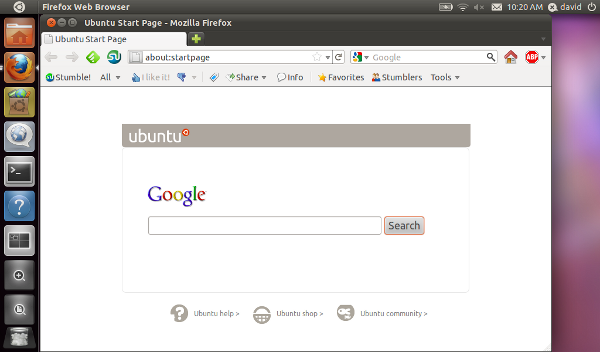Canonical has released a new version of their popular Linux distriution, Ubuntu. Will 2011 finally be the year of the Linux desktop? If Ubuntu 11.04 is any indication, it’s pretty close to being so.
For years, geeks have been saying that Linux would eventually overtake Microsoft Windows and Mac OS as the operating system of choice, but most nontechnical users found it a user-hostile system, having to wade through terse manual pages and type in obscure commands.
Mark Shuttleworth set out to change all that by founding Canonical and releasing a version of Linux called “Ubuntu,” a South African word meaning “Humanity to Others.” Ubuntu’s tagline was “Linux for Human Beings” and came tantalizingly close to something a normal user could install and use without having to constantly bug a guru for help.
With the new version, codenamed “Natty Narwhal” (Ubuntu releases are alliteratively named after animals. The last release, 10.10, was “Maverick Meerkat.”) is a major overhaul.
The most visible change is the new interface, called Ubiquity. Ubiquity is intended to minimize distractions and let you get to your applications and files instantly. You can launch programs from a launcher bar on the left side of the screen. It works like the Dock in Mac OS X, letting you get to frequently-used applications quickly.
Clicking on the top left corner of the screen takes you to the Dash, which lets you search for applications and files.
A workspace switcher lets you take advantage of multiple desktops to reduce window clutter. You can move windows seamlessly between workspaces.
People in the Ubuntu community seem to either love it or hate it and, perhaps sensing the controversy, Ubuntu has made the classic GNOME-based desktop available in Narwhal. They apparently think that the holdouts will get used to Ubiquity, as the Ubuntu 11.10 released scheduled for next year will do away with it.
The other changes are to the software applications shipping with the system. The version of Firefox is upgraded from 3.6 to 4.0.
Previous versions of Ubuntu also shipped with OpenOffice.org, a free office suite that can read and write Microsoft Office documents. It’s been replaced with LibreOffice, a fork of the project that formed after disagreements with Oracle, who were in charge of OpenOffice after their acquisition of Sun Microsystems.
Banshee replaces Amarok as Ubuntu’s music player. It has a music store with a healthy selection and can sync with iPods and other music players.
Ubuntu is a truly “batteries-included” operating system, as it comes with a program to let you do just about everything. There’s also a Software Center where you can download free apps as well as buy some commercial software.
You can run Ubuntu without installing from a CD or USB stick, and the installer is easy to understand. There’s nothing to lose if you want to try something different from Windows or Mac OS X.
We covered Jolicloud, another version of Linux aimed at netbooks and a geeky parent who used Ubuntu to rock a baby to sleep.
Via: Ubuntu











